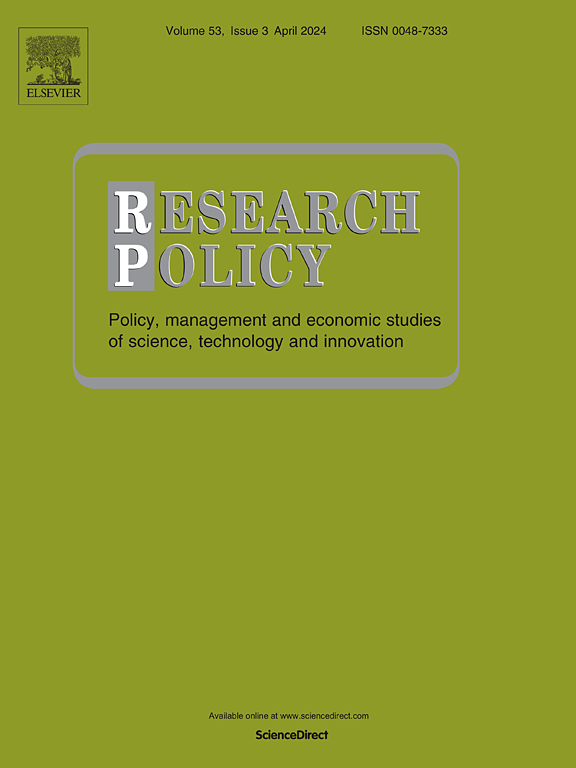科学知识本土化
IF 8
1区 管理学
Q1 MANAGEMENT
引用次数: 0
摘要
科学研究和社会经济优势在地理上似乎是共存的。与技术知识溢出一样,科学研究的这些好处往往归因于人际科学知识溢出的本地化。然而,精心设计的因果关系设计未能证实科学中的知识溢出或估计技术和科学溢出之间的差异。如果发表的科学没有本地化——并且对所有人免费提供——那么公司就没有理由在其来源附近选址,国家也没有理由资助科学研究。我们分离了人际溢出的机制,并提供了科学知识本地化的因果证据和定量可视化;随着一位科学家的意外离开,并将死亡作为一种准自然实验,在死者周围20英里半径内,没有当地合作者的论文收到的科学论文减少28%,医学论文减少45%,专利引用减少67%,相对于其他地理位置的仍然活着的合作者而言。随着时间的推移,这种影响首先加深,然后减弱,在科学家的估计范围内保持不变,直到180英里处单调下降。本文章由计算机程序翻译,如有差异,请以英文原文为准。
Science knowledge localizes
Science research and socio-economic advantage appear to co-locate geographically. As with technology knowledge spillovers, these benefits of science research are often ascribed to the localization of interpersonal science knowledge spillovers. Well-crafted causal designs have failed, however, to confirm knowledge spillovers in science or estimated the differences between technology and science spillovers. If published science did not localize – and was freely available to all – then firms would have little reason to locate near its source and nations little reason to fund science research. We isolate the mechanism of interpersonal spillovers and provide arguably causal evidence and quantitative visualization of the localization of science knowledge; following the unexpected departure of a scientist, and leveraging death as a quasi-natural experiment, papers without local co-authors receive 28 % fewer science paper, 45 % fewer medical paper, and 67 % fewer patent citations, from within a radius of 20 miles around the deceased, relative to still-living co-authors in other geographical locations. The effects first deepen and then attenuate with time, hold for within scientist estimations, and decrease monotonically up to 180 miles.
求助全文
通过发布文献求助,成功后即可免费获取论文全文。
去求助
来源期刊

Research Policy
MANAGEMENT-
CiteScore
12.80
自引率
6.90%
发文量
182
期刊介绍:
Research Policy (RP) articles explore the interaction between innovation, technology, or research, and economic, social, political, and organizational processes, both empirically and theoretically. All RP papers are expected to provide insights with implications for policy or management.
Research Policy (RP) is a multidisciplinary journal focused on analyzing, understanding, and effectively addressing the challenges posed by innovation, technology, R&D, and science. This includes activities related to knowledge creation, diffusion, acquisition, and exploitation in the form of new or improved products, processes, or services, across economic, policy, management, organizational, and environmental dimensions.
 求助内容:
求助内容: 应助结果提醒方式:
应助结果提醒方式:


